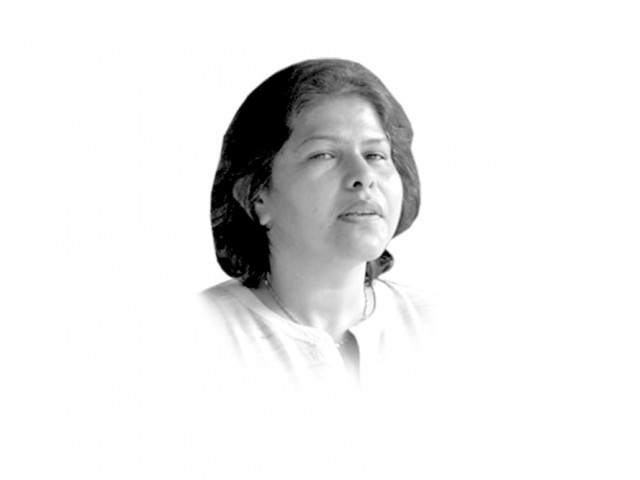Shades of grey
Extremist values, historically, are the alternative, not mainstream discourse. People have to be reminded of that

The writer is an independent social scientist and author of Military Inc. She tweets @iamthedrifter

Furthermore, the minister claimed that the proposed military courts will not target political parties, media or madrassas. There are situations where political party workers are involved in sectarian killings. Also, does the statement indicate that a compromise has already been made in which sources of extremism and terrorism will not be reviewed? If, under the new system, some of the religious parties — which are a major source for expansion of militant networks — continue to block an assessment of madrassas, then what exactly is new about the action plan? Will these special courts only attend to cases in which state functionaries were targeted?
In this game of colours, we can’t afford to ignore the central role specific madrassas play in the extremism-terrorism nexus. The issue is not necessarily their curriculum. In fact, many important madrassas teach English and computers. It is the ideology of the teachers which is a major issue. Since many of the sympathisers and members of various militant outfits are teachers in these seminaries, it is how they eventually interpret and present religious text that is a major issue. It is worth noting that the knowledge of Islamic history and personalities is very poor. Any introduction to a historical personality is partial and mainly in the context of explaining some text. You cannot expect peace to get restored as long as such mindsets remain unchallenged. Or do we also plan to use the military to watch over society?
Why is it that the Peshawar incident, which justified a major constitutional change resulting in surrender of civilian power, could not be used to start the process of madrassa reforms? Indubitably, madrassas are not the only issue. We now have some English-medium schools doing the same job. In fact, some militant outfits have opened English-medium schools and have student wings inside many public-sector universities. Challenging these requires a revisit of the entire education policy, especially the government’s role in regulating private education. You cannot touch madrassas until the state is willing to harness private English schools as well.
Sounds like an uphill task but surely there are things which the state can do with greater ease, such as implementing existing laws. For instance, why can’t the government enforce the law to ensure that its mosques are not used for extremist purposes? Or why can’t it implement an existing law that calls for separate registration of mosques from madrassas. Mosques are meant to be open spaces, which cannot be closed to the public. Mosques controlled by militant groups often do not allow entry because they have established a madrassa there, which propagates a certain ideology. Is it possible to just make sure that no one is allowed to restrict people’s entry into a mosque, or that no particular group controls it?
For all the promises of commitment by the government, it is creating lacunas that would dampen even the role that civil society could play in contributing to counter-extremism. How does one explain the lack of will to discipline Maulana Abdul Aziz despite his threats to innocent citizens, when all they wanted to do was pray inside a government mosque? Similarly, shouldn’t the government help when zealots attacked civil society members in Lahore commemorating Salmaan Taseer’s death anniversary?
The state’s absence doesn’t help a civil society eager to expand the social space but is weakened by the state’s lack of cohesion or absence of a clear agenda. There appears to be a fractured consensus on creating a liberal space because of diverse interests and agendas. Individuals and groups don’t need to see eye-to-eye on issues but the inner differences and contradictions will have to be set aside in order to cooperate with one another. Otherwise, the radical militant and mullah, who was encouraged by the state to occupy civil space for the last three decades, is much better organised and understands that he is being fought by a group of people who usually do not act unless they can get funding from somewhere.
Maulana Aziz’s strength is not just the support he may have from within the establishment, but it is also the understanding that those claiming to reclaim the mosque would not last long. Wonder how many of the protestors would go to a mosque five times a day for the next 365 days? The strategy of liberalising religion from zealots is extremely challenging. Not engaging with religion is not an option because this is the only narrative which sells in society. But building a movement to rationalise religious discourse requires support and greater numbers. This means that the current movement will have to find a way to break out of its current socioeconomic class boundary and reach out to ordinary people. It also means engagement with political parties and their party cadres to market a new discourse. But then a new discourse has to be developed strictly with internal efforts and funding and should not be tainted by donor money. Perhaps, gathering a group of religious scholars to think about alternatives could be a process. Extremist values, historically, are the alternative and not mainstream religious discourse. People have to be reminded of that.
Published in The Express Tribune, January 8th, 2015.
Like Opinion & Editorial on Facebook, follow @ETOpEd on Twitter to receive all updates on all our daily pieces.














COMMENTS
Comments are moderated and generally will be posted if they are on-topic and not abusive.
For more information, please see our Comments FAQ